The glass cloth electrical insulation tape market begins its decade journey from a USD 125.9 million foundation in 2025, setting the stage for steady expansion ahead. The first half of the period witnesses consistent momentum building, with market value climbing from USD 130.3 million in 2026 to USD 144.4 million by 2030. This initial phase reflects growing electrical infrastructure development and increasing demand for high-temperature resistant insulation solutions across industrial applications.
The latter half will witness sustained growth dynamics, propelling the market from USD 149.5 million in 2031 to reach USD 177.5 million by 2035. Dollar additions during 2030-2035 maintain steady progression, with annual increments averaging USD 6.6 million compared to USD 3.7 million in the first phase. This progression represents a 41.0% total value increase over the forecast decade.
Market maturation factors include expanding renewable energy infrastructure, aerospace industry growth, and automotive electrification acceleration. The 3.5% compound annual growth rate positions participants to capitalize on USD 51.6 million in additional market value creation. This trajectory signals robust opportunities for specialty tape manufacturers, electrical equipment producers, and industrial insulation suppliers across the global electrical infrastructure landscape.
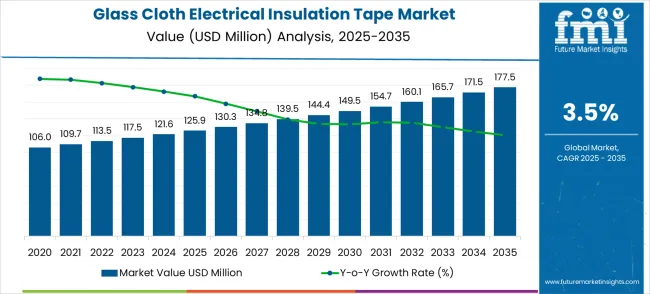
Market expansion unfolds through two distinct growth periods with different technological advancement characteristics for each phase. The 2025-2030 foundation period delivers USD 18.5 million in value additions, representing 14.7% growth from the baseline. Market dynamics during this phase center on electrical infrastructure modernization, renewable energy deployment acceleration, and high-temperature application expansion.
The 2030-2035 acceleration period generates USD 33.1 million in incremental value, reflecting 22.9% growth from the 2030 position. This phase exhibits mature market characteristics with enhanced competition, product innovation strategies, and emerging application development initiatives. Dollar contributions shift from foundational infrastructure development to market share optimization and technological advancement.
The competitive landscape evolves from traditional electrical insulation applications to meet advanced high-performance requirements. The first period focuses on improving product quality and expanding the application range. The second period witnesses intensified competition for premium market segments and expansion of geographical territories. Market maturation factors include standardized performance specifications, enhanced temperature resistance capabilities, and cross-industry application development across electrical, automotive, aerospace, and construction sectors.
Market expansion rests on four fundamental shifts driving electrical and industrial demand acceleration:
However, growth faces headwinds from raw material price volatility affecting production costs and environmental regulations impacting manufacturing processes. Alternative insulation technology development may create competitive pressure in specific applications. Technical complexity creates adoption barriers requiring specialized expertise for optimal product selection and application.
Primary Classification: Adhesive Type Distribution
Secondary Breakdown: Application Categories
Geographic Segmentation: Regional Market Distribution
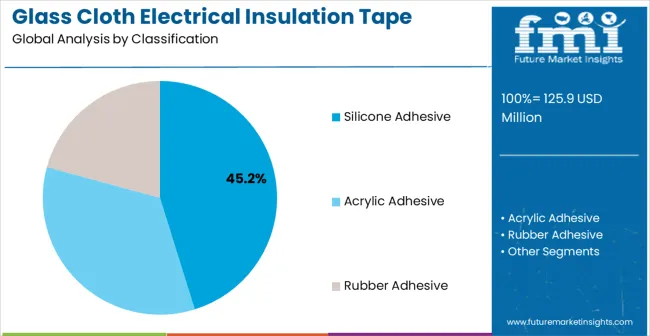
Market Position: Silicone adhesive glass cloth electrical insulation tape establishes clear market leadership through superior high-temperature performance and chemical resistance capabilities. Silicone chemistry provides excellent thermal stability from -65°C to +200°C enabling applications in extreme environment conditions. Adhesive system offers outstanding electrical insulation properties while maintaining flexibility and conformability.
Value Drivers: Advanced silicone formulations extend operational temperature ranges and improve aging resistance for long-term reliability. Chemical resistance properties enable applications in harsh industrial environments with exposure to solvents and chemicals. Flame retardant characteristics meet stringent safety requirements for electrical and aerospace applications.
Competitive Advantages: Silicone adhesive systems offer proven performance history in critical applications reducing qualification time and regulatory approval requirements. Temperature stability enables applications impossible with alternative adhesive chemistries expanding market opportunities. Electrical properties remain stable across temperature ranges ensuring consistent insulation performance.
Market Challenges: Higher material costs compared to acrylic and rubber adhesive alternatives may limit adoption in price-sensitive applications. Processing requirements need specialized equipment and curing conditions increasing manufacturing complexity. Limited recyclability creates disposal challenges in environmentally conscious applications.
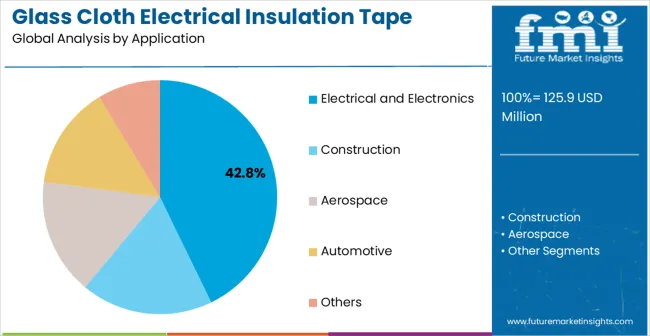
Strategic Market Importance: Electrical and electronics applications represent the primary demand driver for glass cloth electrical insulation tape across power generation, transmission, and distribution equipment. Transformer manufacturing, motor winding, and electrical panel assembly require high-performance insulation materials for safety compliance and operational reliability. Quality requirements mandate certified insulation solutions meeting international electrical safety standards.
Business Logic: Electrical applications prioritize safety and reliability, making high-performance insulation tapes essential for equipment protection and regulatory compliance. Performance requirements demand materials providing long-term insulation integrity under electrical stress and environmental exposure. Cost justification occurs through reduced maintenance requirements and extended equipment service life.
Forward-looking Implications: Grid modernization drives demand for advanced insulation materials capable of higher operating temperatures and electrical stress levels. Renewable energy integration creates specialized application requirements for marine and extreme climate environments. Industrial automation expansion sustains insulation material demand across control systems and motor applications.
Global market dynamics reveal distinct performance tiers reflecting regional electrical infrastructure development and manufacturing capabilities. Growth Leaders including China (4.7% CAGR) and India (4.4% CAGR) demonstrate expanding electrical infrastructure investment with advanced insulation material adoption, while Germany (4.0% CAGR) represents European manufacturing excellence and renewable energy leadership. Steady Performers such as Brazil (3.7% CAGR) and the United States (3.3% CAGR) show consistent demand growth aligned with infrastructure modernization and industrial expansion requirements. Mature Markets including the United Kingdom (3.0% CAGR) and Japan (2.6% CAGR) display moderate growth rates reflecting established infrastructure base and technology advancement focus.
Regional synthesis indicates Asia Pacific dominance through manufacturing concentration and infrastructure development acceleration. North American markets emphasize grid modernization and renewable energy deployment. European regions focus on energy transition and advanced manufacturing applications.
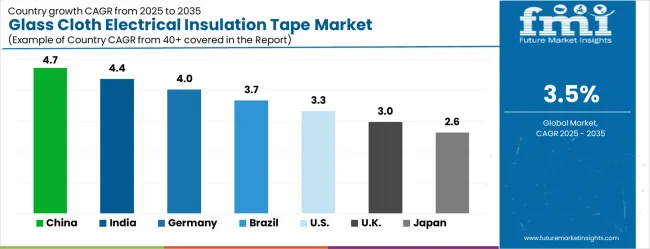
| Country | CAGR (%) |
|---|---|
| China | 4.7 |
| India | 4.4 |
| Germany | 4.0 |
| Brazil | 3.7 |
| USA | 3.3 |
| UK | 3.0 |
| Japan | 2.6 |
China establishes market leadership through expanding electrical infrastructure development and manufacturing capability advancement. A 4.7% CAGR value reflects extensive power generation expansion and export-oriented electrical equipment production requirements. Growth metrics demonstrate sustained expansion supported by government infrastructure investment and renewable energy deployment mandates.
Market dynamics center on smart grid development creating demand for advanced insulation materials and international standard compliance. Manufacturing modernization drives adoption of high-performance electrical insulation solutions for quality improvement and export competitiveness. Belt and Road Initiative projects necessitate certified electrical materials for international infrastructure development.
Manufacturing hub concentration in electrical equipment production zones creates demand density for specialized insulation materials. Industrial development initiatives include advanced electrical infrastructure requiring premium insulation solutions. Foreign technology partnerships bring international electrical standards requiring certified insulation material adoption.
Strategic Market Indicators:
India demonstrates robust growth potential through expanding electrical infrastructure development and manufacturing capability enhancement. A 4.4% CAGR reflects increasing power generation capacity and industrial electrical equipment production supporting economic development objectives. Infrastructure expansion under government initiatives creates consistent demand for reliable electrical insulation solutions across applications.
Power sector growth drives primary demand through generation facility construction and transmission network expansion. Government electrification programs require certified electrical insulation materials for safety compliance and system reliability. Industrial development projects increase electrical equipment production requiring specialized insulation solutions.
Market activity centers on technology transfer agreements bringing international electrical standards to domestic infrastructure projects. Foreign investment in electrical equipment manufacturing introduces advanced insulation material requirements for export competitiveness. Skill development initiatives include training programs for electrical installation and maintenance procedures.
Market Intelligence Brief:
Demand for glass cloth electrical insulation tape in Germany maintains 4.0% CAGR market leadership through engineering excellence and renewable energy technology development. The market demonstrates established industrial base with advanced electrical equipment manufacturing capabilities. Energy transition initiatives create consistent demand for specialized insulation materials across renewable energy and grid modernization applications.
Electrical equipment manufacturing expertise enables production of premium insulation solutions for export markets. Renewable energy leadership drives innovation in insulation materials for offshore wind power and solar energy applications. Technology standard development influences global electrical equipment practices requiring advanced insulation specifications.
Advanced manufacturing research initiatives develop new applications for high-performance electrical insulation materials. Export market leadership necessitates quality certification supporting international sales and regulatory compliance. Industrial automation advancement creates demand for precision electrical insulation solutions.
Performance Metrics:
Brazil represents emerging market growth with a 3.7% CAGR through electrical infrastructure expansion and industrial development acceleration. The market reflects increasing electrical power capacity and manufacturing sector growth supporting economic development requirements. Government infrastructure initiatives create demand for certified electrical insulation materials across power generation and transmission applications.
Electrical power sector expansion drives primary market demand through hydroelectric facility development and transmission line construction. Industrial growth creates opportunities for electrical equipment manufacturing requiring specialized insulation solutions. Mining sector development increases industrial electrical equipment demand requiring reliable insulation materials.
Market development challenges include economic volatility affecting infrastructure investment and import cost fluctuations impacting material pricing. Infrastructure development projects support electrical equipment manufacturing requiring consistent insulation material supply chains.
Strategic Market Considerations:
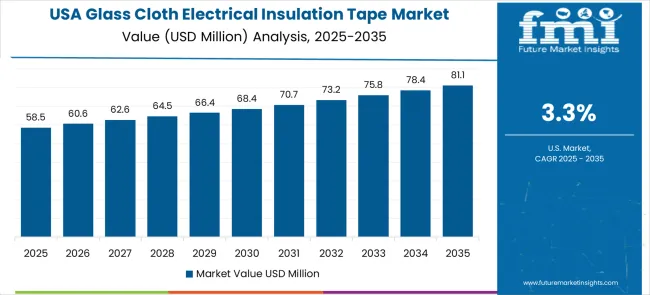
United States market demonstrates steady growth with a CAGR of 3.3% through electrical grid modernization and renewable energy deployment. The market reflects established infrastructure base with ongoing modernization initiatives requiring advanced electrical insulation solutions. Innovation leadership creates demand for high-performance insulation materials supporting grid reliability and renewable energy integration.
Power grid modernization requires specialized insulation materials for smart grid equipment and advanced transmission systems. Renewable energy sector growth creates opportunities for insulation materials in solar and wind power installations. Aerospace industry leadership maintains consistent demand for certified insulation materials meeting stringent performance requirements.
Infrastructure investment initiatives encourage electrical equipment manufacturing advancement utilizing premium insulation materials. Safety regulation compliance ensures insulation material quality and performance standards. Technology innovation drives development of advanced electrical insulation solutions for emerging applications.
Market Development Indicators:
United Kingdom demonstrates market stability through energy transition initiatives and electrical infrastructure modernization. A 3.0% CAGR market value reflects established electrical system base with renewable energy integration emphasis. Offshore wind power leadership creates demand for specialized electrical insulation materials capable of marine environment performance.
Electrical infrastructure modernization maintains demand for high-performance insulation materials in grid upgrade and smart meter deployment projects. Renewable energy sector leadership requires specialized insulation solutions for offshore wind installations and energy storage systems. Industrial automation advancement creates opportunities for precision electrical insulation applications.
Energy transition policies emphasize grid flexibility and renewable energy integration requiring advanced electrical equipment with specialized insulation materials. Export market development creates opportunities for electrical equipment manufacturing utilizing premium insulation solutions.
Current Market Observations:
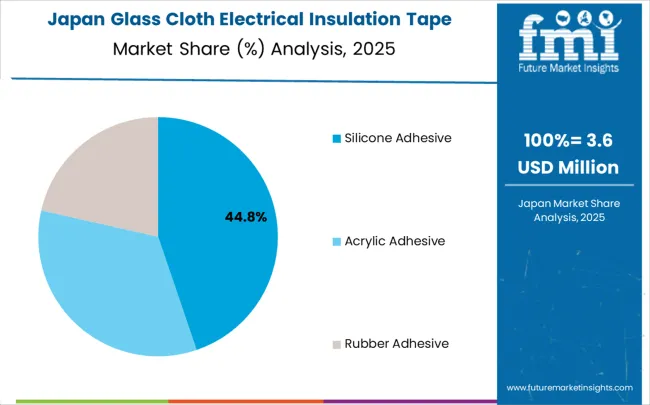
Japan maintains technological leadership through precision manufacturing with a 2.6% CAGR excellence and advanced electrical equipment development. The market value reflects mature industrial base with established electrical insulation material adoption across diverse applications. Technology innovation initiatives create demand for specialized insulation materials supporting advanced electrical system requirements.
Electrical equipment manufacturing excellence requires precision insulation materials for export market competitiveness. Industrial automation leadership utilizes advanced electrical insulation solutions for robotics and control system applications. Quality management system development influences global electrical equipment manufacturing practices.
Manufacturing technology expertise enables production of specialized electrical insulation materials meeting stringent performance requirements. Research and development initiatives advance insulation material performance and application versatility. Consumer electronics industry maintains consistent demand for precision electrical insulation solutions.
Market Status Indicators:
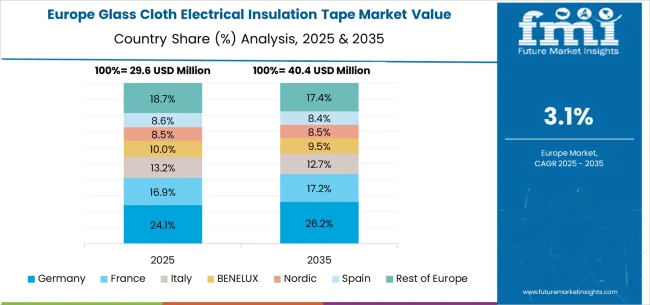
The European glass cloth electrical insulation tape market totaled USD 42.7 million in 2025, representing 33.9% of global market share. Germany dominates with 32.4% European market share, leading through electrical equipment manufacturing excellence and renewable energy integration capabilities. France contributes USD 9.8 million in specialized electrical insulation manufacturing, emphasizing nuclear power and aerospace applications. The UK market valued at USD 8.2 million shows 3.0% CAGR growth driven by offshore wind power development. Italy holds USD 6.7 million with industrial automation specialization. Netherlands demonstrates USD 4.3 million with electrical infrastructure excellence. Spain projects 3.8% CAGR through renewable energy expansion. Nordic countries show USD 5.1 million with hydroelectric power focus. Market integration enables cross-border electrical standards harmonization with 90-95% certified insulation material adoption in established electrical equipment manufacturing.
Germany's electrical engineering excellence drives silicone adhesive dominance through high-temperature application requirements and renewable energy equipment manufacturing. The 45.2% market share reflects German engineering principles emphasizing reliability and performance under extreme conditions. Electrical equipment production utilizes silicone adhesive systems for proven thermal stability in transformer and motor applications.
Renewable energy sector creates demand for silicone-based insulation materials accommodating offshore wind power environmental requirements. Industrial automation manufacturing produces precision electrical equipment requiring temperature-stable insulation solutions. Engineering services sector benefits from silicone reliability enabling comprehensive electrical system development.
Secondary segments including acrylic and rubber adhesive systems maintain combined 54.8% share through applications requiring specific performance characteristics or cost optimization. Standard electrical applications utilize alternative adhesive systems for proven performance at competitive pricing. Specialized applications select adhesive chemistry based on specific environmental and performance requirements.
Market Characteristics:
France's electrical equipment sector demonstrates application leadership through integrated power generation and aerospace manufacturing operations supporting nuclear power and defense requirements. Service provider landscape includes comprehensive electrical insulation solutions addressing power generation, aerospace, and industrial automation needs across diverse applications. Market share distribution reflects established relationships between insulation material suppliers and major electrical equipment manufacturers.
Nuclear power industry concentration creates demand for specialized electrical insulation services including high-temperature applications, radiation resistance, and long-term reliability programs. Aerospace manufacturing requires comprehensive insulation support for aircraft electrical systems and space applications. Industrial automation integration creates technical support opportunities for precision electrical equipment applications.
Provider evolution trends indicate movement toward comprehensive solution offerings beyond traditional insulation material supply. Service integration includes application engineering support, performance testing programs, and regulatory compliance assistance. Technology advancement requires continuous technical support and specialized application development for competitive differentiation.
Channel Insights:
Market structure reflects moderate concentration with established specialty tape manufacturers maintaining significant market positions while regional suppliers serve localized segments. Competition style emphasizes product performance differentiation, technical service capability development, and industry certification compliance. Industry dynamics favor companies combining manufacturing excellence with comprehensive technical support offerings.
Tier 1 - Global Market Leaders: 3M, Nitto Denko, and similar multinational specialty tape corporations dominate through comprehensive electrical insulation portfolios, global manufacturing networks, and technical expertise capabilities. Competitive advantages include research and development resources, established customer relationships, and manufacturing scale economies. Market positions reflect brand recognition and quality reputation across diverse electrical and industrial applications.
Tier 2 - Specialized Technology Providers: Companies like IPG, Saint-Gobain, and Scapa focus on specific application segments or regional markets through specialized product offerings. Competitive advantages include application expertise, technical service flexibility, and industry certification compliance. Market positioning emphasizes technical specialization and customer relationship development.
Tier 3 - Regional and Application Specialists: Smaller companies including TERAOKA, Plymouth Rubber, and regional suppliers serve local markets and specialized applications. Competitive advantages include cost competitiveness, local service capabilities, and customization flexibility. Market participation focuses on price-sensitive segments and specialized performance requirements.
The glass cloth electrical insulation tape market is central to electrical safety, industrial reliability, renewable energy deployment, and technological advancement. With grid modernization demands, electrification trends, and stringent safety requirements, the sector faces pressure to balance performance excellence, cost efficiency, and environmental compliance. Coordinated action from governments, industry bodies, equipment manufacturers, suppliers, and investors is essential to transition toward high-performance, environmentally sustainable, and digitally integrated electrical insulation solutions.
How Governments Could Spur Local Production and Adoption?
How Industry Bodies Could Support Market Development?
How Equipment Manufacturers and Technology Players Could Strengthen the Ecosystem?
How Suppliers Could Navigate the Shift?
How Investors and Financial Enablers Could Unlock Value?
ESG-Focused Capital: Channel investment toward companies demonstrating measurable environmental improvements, worker safety excellence, and circular economy adoption in electrical insulation tape manufacturing operations.
| Item | Value |
|---|---|
| Quantitative Units | USD 125.8 million |
| Adhesive Type | Silicone Adhesive, Acrylic Adhesive, Rubber Adhesive, Others |
| Application | Electrical and Electronics, Construction, Aerospace, Automotive, Others |
| Regions Covered | North America, Latin America, Europe, East Asia, South Asia & Pacific, Middle East & Africa |
| Countries Covered | United States, Canada, Mexico, Germany, United Kingdom, France, Italy, Spain, Nordic, BENELUX, China, Japan, South Korea, India, ASEAN, Australia, New Zealand, Brazil, Chile, Kingdom of Saudi Arabia, GCC Countries, Turkey, South Africa |
| Key Companies Profiled | 3M, Nitto Denko, IPG, Saint-Gobain, Parafix, Scapa, TERAOKA, Plymouth Rubber, PPI Adhesive Products, Creative Global Services |
| Additional Attributes | Dollar sales by product categories, regional demand trends across North America, Europe, and Asia-Pacific, competitive landscape with player descriptions, adoption patterns across industries, integration with electrical equipment manufacturing, innovations in adhesive technology and temperature resistance, development of specialized applications with enhanced performance capabilities |
The global glass cloth electrical insulation tape market is estimated to be valued at USD 125.9 million in 2025.
The market size for the glass cloth electrical insulation tape market is projected to reach USD 177.5 million by 2035.
The glass cloth electrical insulation tape market is expected to grow at a 3.5% CAGR between 2025 and 2035.
The key product types in glass cloth electrical insulation tape market are silicone adhesive, acrylic adhesive and rubber adhesive.
In terms of application, electrical and electronics segment to command 42.8% share in the glass cloth electrical insulation tape market in 2025.






Our Research Products

The "Full Research Suite" delivers actionable market intel, deep dives on markets or technologies, so clients act faster, cut risk, and unlock growth.

The Leaderboard benchmarks and ranks top vendors, classifying them as Established Leaders, Leading Challengers, or Disruptors & Challengers.

Locates where complements amplify value and substitutes erode it, forecasting net impact by horizon

We deliver granular, decision-grade intel: market sizing, 5-year forecasts, pricing, adoption, usage, revenue, and operational KPIs—plus competitor tracking, regulation, and value chains—across 60 countries broadly.

Spot the shifts before they hit your P&L. We track inflection points, adoption curves, pricing moves, and ecosystem plays to show where demand is heading, why it is changing, and what to do next across high-growth markets and disruptive tech

Real-time reads of user behavior. We track shifting priorities, perceptions of today’s and next-gen services, and provider experience, then pace how fast tech moves from trial to adoption, blending buyer, consumer, and channel inputs with social signals (#WhySwitch, #UX).

Partner with our analyst team to build a custom report designed around your business priorities. From analysing market trends to assessing competitors or crafting bespoke datasets, we tailor insights to your needs.
Supplier Intelligence
Discovery & Profiling
Capacity & Footprint
Performance & Risk
Compliance & Governance
Commercial Readiness
Who Supplies Whom
Scorecards & Shortlists
Playbooks & Docs
Category Intelligence
Definition & Scope
Demand & Use Cases
Cost Drivers
Market Structure
Supply Chain Map
Trade & Policy
Operating Norms
Deliverables
Buyer Intelligence
Account Basics
Spend & Scope
Procurement Model
Vendor Requirements
Terms & Policies
Entry Strategy
Pain Points & Triggers
Outputs
Pricing Analysis
Benchmarks
Trends
Should-Cost
Indexation
Landed Cost
Commercial Terms
Deliverables
Brand Analysis
Positioning & Value Prop
Share & Presence
Customer Evidence
Go-to-Market
Digital & Reputation
Compliance & Trust
KPIs & Gaps
Outputs
Full Research Suite comprises of:
Market outlook & trends analysis
Interviews & case studies
Strategic recommendations
Vendor profiles & capabilities analysis
5-year forecasts
8 regions and 60+ country-level data splits
Market segment data splits
12 months of continuous data updates
DELIVERED AS:
PDF EXCEL ONLINE
Glass Rolling Forming Machine Market Size and Share Forecast Outlook 2025 to 2035
Glass Liquor Bottle Market Size and Share Forecast Outlook 2025 to 2035
Glass Bottles Market Forecast and Outlook 2025 to 2035
Glass Laser Engraving Machine Market Size and Share Forecast Outlook 2025 to 2035
Glass Restoration Kit Market Size and Share Forecast Outlook 2025 to 2035
Glass Bottle and Container Market Forecast and Outlook 2025 to 2035
Glass Additive Market Forecast and Outlook 2025 to 2035
Glass Reactor Market Size and Share Forecast Outlook 2025 to 2035
Glass Cosmetic Bottle Market Size and Share Forecast Outlook 2025 to 2035
Glass & Metal Cleaner Market Size and Share Forecast Outlook 2025 to 2035
Glass Product Market Size and Share Forecast Outlook 2025 to 2035
Glassine Paper Market Size and Share Forecast Outlook 2025 to 2035
Glass Container Market Size and Share Forecast Outlook 2025 to 2035
Glass Fibre Yarn Market Size and Share Forecast Outlook 2025 to 2035
Glass Bonding Adhesive Market Size and Share Forecast Outlook 2025 to 2035
Glass Mat Thermoplastic Market Size and Share Forecast Outlook 2025 to 2035
Glass Table Bacteria Tank Market Size and Share Forecast Outlook 2025 to 2035
Glassine Paper Industry Analysis in Western Europe Size and Share Forecast Outlook 2025 to 2035
Glassine Paper Industry Analysis in Korea Size and Share Forecast Outlook 2025 to 2035
Glassine Paper Industry Analysis in Japan Size and Share Forecast Outlook 2025 to 2035

Thank you!
You will receive an email from our Business Development Manager. Please be sure to check your SPAM/JUNK folder too.
Chat With
MaRIA